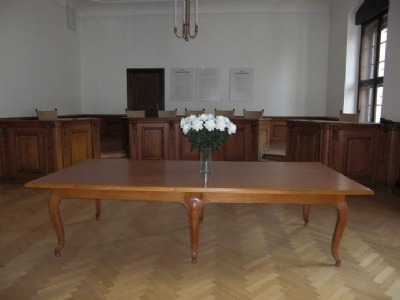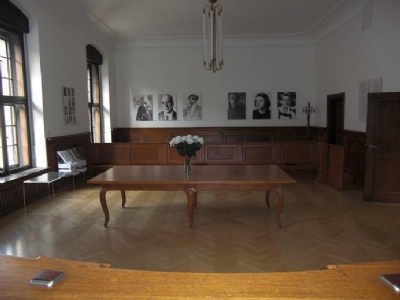München – Justice Palace
In 1943, three trials were held in Munich’s Justice Palace (Justizpalast) against members of the White Rose (Weisse Rose). A group of students from the University of Munich who had spread antinazist flyers at the university. The first trial was held in Schwurgerichtssaal on 22 February against siblings Hans and Sophie Scholl and Christoph Probst who were accused of high treason for the proliferation of antinazist fliers. The trial began at 10 am and ended at 13.30 when the Prosecutor and judge, Roland Freisler, sentenced all three to death by beheading. On April 19, the second trial was held in Sitzungssaal 216 (currently 253) against another 14 group members.
This trial rendered in three death sentences by beheading (Alexander Schmorell, Willi Graf and Kurt Huber), ten to prison while one was surprisingly acquitted. A third trial took place on 13 July (without Freisler as prosecutor/judge) and this time only one member was sentenced to prison while the others were acquitted. Two more trials were held against members of the White Rose. On April 3, 1944, one was held in Saarbrücken and on October 13, 1944, one was held in the Donauwörth. The actions of the white rose were isolated and did not affect the political situation in any way, it was only after the war that the group’s actions were noticed and highlighted.
Current status: Preserved with museum (2010).
Address: Prielmayerstrasse 7, 80335 München.
Get there: Metro to Karlsplatz Station.
Follow up in books: Wilson, Kip: White Rose (2019).



It is said that Sophie Scholl defended her actions during the trial by defiantly saying, ”so many people think exactly what we have said and written but dare not say it”. How likely it is that a young inexperienced and modest woman uttered this before a brutal Nazi court can certainly be discussed. But it definitely strengthened the myth surrounding her as an opponent to Nazism but it came with uttermost price, her own life.
But regardless, the trial was held after Germany’s military disaster at Stalingrad barely a month earlier. A defeat that made people start to doubt Hitler and Nazism, but there were few who really dared to do anything. The reason, of course, was that they knew that it was associated with mortal danger and therefore refrained. But how harsh and condemnatory should we be to those who thought like Sophie Scholl, but refrained due to the risks? Should one blame a man who is not willing to risk his life for a higher political ideal?